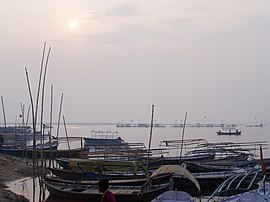2013 Prayag Kumbh Mela stampede
 From Wikipedia - Reading time: 8 min
From Wikipedia - Reading time: 8 min
| Date | 10 February 2013 |
|---|---|
| Location | Allahabad, Uttar Pradesh, India |
| Deaths | 42 |
| Non-fatal injuries | 45 |
On 10 February 2013, during the Hindu festival of Kumbh Mela, a stampede broke out at the train station in Allahabad, Uttar Pradesh, India, killing 42 people and injuring at least 45 people.
Background
[edit]
Kumbh Mela is a major Hindu religious festival that is celebrated every three years in four rotating places. The 2013 event was considered a Maha Kumbh Mela, which comes around only once every 144 years. It lasted 55 days and was expected to be attended by 100 million pilgrims, making it the largest temporary gathering of people in the world at that time. A temporary city covering an area larger than Athens was set up to accommodate the crowds.[1] Sunday, 10 February was considered the most auspicious day, and 30 million people descended to Allahabad to bathe at the confluence of the Yamuna and the Ganges rivers.[1][2]
The stampede
[edit]According to initial reports, the stampede broke out after a railing on a footbridge collapsed at the Allahabad railway station. Eyewitnesses, however, said that the stampede was triggered after the railway police charged at the crowd with wooden sticks in order to control the huge rush at the station. 42 people were killed by the crush of people, including 29 women, 12 men, and an eight-year-old girl who died after waiting almost two hours for help.[3] At least 45 people were injured in addition.[4]
In an unrelated event earlier that day, two people were killed in another stampede.[5]
Reaction
[edit]Prime Minister Manmohan Singh expressed condolences and offered compensation to the affected people.[6] Uttar Pradesh chief minister Akhilesh Yadav constituted a committee to probe the stampede.[7] Uttar Pradesh's Panchayati Raj minister, Balram Yadav said that the inquiry would be launched and completed within a month.[8]
On 11 February 2013, Samajwadi Party leader Azam Khan, who was in charge of the Kumbh Mela, took responsibility for the stampede and resigned.[4][9] Praising the minister for his sincere work, Uttar Pradesh Chief Minister, rejected Khan's resignation. [10]
Other stampedes
[edit]Due to the huge number of attendees stampedes are relatively common during Kumbh Mela festivals. The 1954 Kumbh Mela stampede was the deadliest since India's independence, with an estimated 1,000 deaths. The 2003 Kumbh Mela stampede killed 39 people in the city of Nashik, and seven were killed during the 2010 Kumbh Mela in Haridwar.[11]
References
[edit]- ^ a b "Allahabad stampede kills 36 Kumbh Mela pilgrims". Reuters. 11 February 2013. Archived from the original on 5 March 2016. Retrieved 12 February 2013.
- ^ "India's Kumbh Mela festival holds most auspicious day". BBC. 11 February 2013. Retrieved 12 February 2013.
- ^ "Police blamed for Kumbh Mela deaths". Bangkok Post. 12 February 2013. Retrieved 12 February 2013.
- ^ a b "Kumbh Mela chief Azam Khan resigns over stampede". BBC. 11 February 2013. Retrieved 12 February 2013.
- ^ "Two killed in stampede at Kumbh Mela". NDTV. 10 February 2013. Retrieved 12 February 2013.
- ^ "Over 10 people killed in stampede at Allahabad railway station- Uttar Pradesh". IBN Live. 10 February 2013. Archived from the original on 13 February 2013. Retrieved 12 February 2013.
- ^ "Stampede at Allahabad Railway station: several feared dead; PM announces help". Hindustan Times. 11 February 2013. Archived from the original on 13 February 2013. Retrieved 12 February 2013.
- ^ "Allahabad tragedy Live: No idea why crowds surged, says Rail official". First Post. 11 February 2013. Retrieved 12 February 2013.
- ^ "Azam Khan resigns as in charge of Kumbh over Allahabad stampede". The Times of India. 11 February 2013. Retrieved 12 February 2013.
- ^ "Akhilesh rejects Azam Khan's resignation as Kumbh in-charge". Retrieved 14 February 2013.
- ^ "Why We Shouldn't Be Surprised by the Kumbh Mela Stampede". The Wall Street Journal. 11 February 2013. Retrieved 12 February 2013.
 KSF
KSF